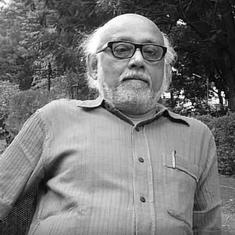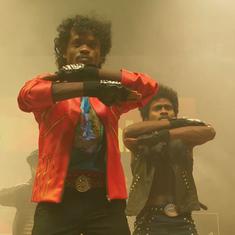A day after the Bharatiya Janata Party walked out of the ruling coalition in Jammu and Kashmir on Tuesday, resulting in the imposition of governor’s rule in the state, the Congress issued a statement enunciating its formal position on the developments.
The statement was drawn up by the party’s policy planning group on Jammu and Kashmir, set up by former Congress president Sonia Gandhi last year to come up with constructive suggestions in the light of escalating violence in the state.
Headed by former Prime Minister Manmohan Singh, the nine-member panel includes senior party leaders Karan Singh, P Chidambaram, Ghulam Nabi Azad, Ambika Soni, Ghulam Ahmed Mir, Rigzrin Zora, Tariq Hameed Karra and Shyam Lal Sharma.
A meeting of the policy planning group was hurriedly convened at Manmohan Singh’s residence in New Delhi on Wednesday, even though most of its members were not in town. The Congress sought the help of members of the policy group to articulate its views on the developments in Jammu and Kashmir as its apex decision-making body – the Congress Working Committee – is yet to be constituted.
Where is the CWC?
The party plenary had authorised Congress president Rahul Gandhi to constitute the new working committee three months ago. But he appears to be in no hurry to set it up. As is customary, the working committee, headed by Sonia Gandhi, was disbanded before the plenary session in March to enable the new chief to choose his own team.
Though Rahul Gandhi has made piecemeal appointments in the Congress organisation over the past several months, the party is effectively functioning without a working committee, which usually comprises senior leaders.
No time-frame has been specified for its formation but a new working committee has always been put in place shortly after a plenary session.
Since it has not been constituted this time, there is no formal platform in the party today where leaders can brainstorm and take decisions on key issues. For instance, the latest developments in Jammu and Kashmir ideally merited a discussion by members of the Congress Working Committee. The inputs of the party’s senior leaders would enable the leadership to arrive at a considered view on important issues.
As a pan-India party, which has been in power for over five decades, the Congress has to weigh the pros and cons before it takes a position on developments in Kashmir. It needs to take a nuanced position – it is constrained from adopting a strident position like the BJP – since it has a presence both in the Muslim-majority Kashmir Valley and the Hindu-dominated Jammu region. Hindus in several Jammu districts rejected the Congress in the last Assembly elections possibly because it was unable to match the BJP’s overtly anti-minority rhetoric.
Today, the Congress was able to fall back on the policy planning group to articulate a view on the Kashmir issue. But what would it have done if this group did not exist?
No transparency
In the absence of the Congress Working Committee, there is no clarity on how important decisions are being made in the party, and who are the leaders being consulted by Rahul Gandhi. As it is, during informal conversations, party insiders constantly criticise the Congress chief for being overdependent on apolitical advisors who have no connect with realpolitik. Party insiders pointed out that in the 2000s, when the Congress took a formal decision to shed its earlier line to walk alone and started exploring possibilities of forming alliances with like-minded parties, it was taken after rigorous internal discussions at the specially-convened chintan shivir at Shimla in 2003, which was attended by the entire top leadership.
The Congress’s decision to play second fiddle to the numerically smaller Janata Dal (Secular) in Karnataka last month is another case that should have been placed before the Congress Working Committee for a thorough discussion, as it has far-reaching implications. Party insiders had first said that it was Sonia Gandhi who sent senior leaders Ghulam Nabi Azad and Ashok Gehlot to Bengaluru to offer the chief minister’s post to Janata Dal (Secular) leader HD Kumaraswamy before the declaration of the results. But later, it was said that Rahul Gandhi had taken this decision.
Though the Congress rank and file was enthused by the fact that the party leadership had acted swiftly to stop the Bharatiya Janata Party from forming the government in Karnataka, there is also concern that the Congress is ceding space to regional forces at its own cost. Their worries have been further amplified after word went out that the Congress will not be averse to a similar arrangement at the national level if it means keeping out the BJP. No effort has been made to assuage these fears and clarify matters.
Will old CWC return?
On the flip side, it is argued that during Sonia Gandhi’s stint as president, the Congress Working Committee was rendered irrelevant. This was especially the case when the United Progressive Alliance government was in power. Congress Working Committee meetings, which once witnessed frank and serious deliberations, were reduced to a farce as they were invariably orchestrated to keep out any unpalatable views. In fact, the committee barely met to take important decisions as these were usually taken by the party’s core committee whose membership was restricted to a few senior leaders.
Rahul Gandhi has a chance to restore the Congress’s apex decision-making body to its old self, when its members were not constrained from airing their views freely. But the question is: will the new Congress chief have the gumption to do so.










